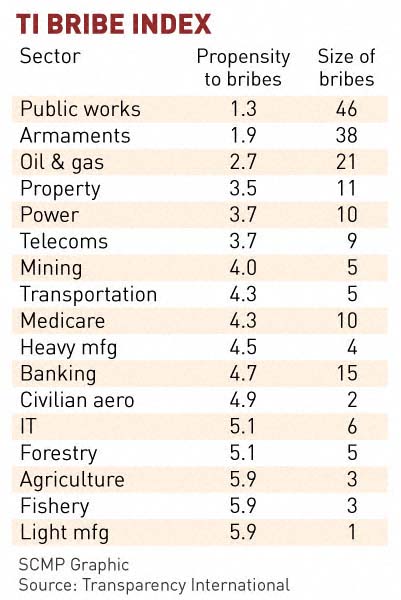|
| ||
|
← "Asia by blog" |
Return to Main Page
| "China at the Big Table" →
September 28, 2004
You are on the invidual archive page of Bribes are like drugs. Click Simon World weblog for the main page.
|
|
Bribes are like drugs
Corruption and bribery are inherent in centrally planned economies, says the SCMP's Jake van der Kamp. He comes up with the simple formulation that the level of bribery is directly proportional to the degree of state involvement in that industry. Furthermore the only solution is not more official announcements of clampdowns but rather less state involvement in that industry. He uses the new survey by Transparency International to make the point (chart in the extended entry). While the survey is looking at levels of bribery in certain sectors, it has an extremely high correlation with the degree of central planning and/or direct government invovlement (as compared to regulation) in that sector. Van der Kamp argues, correctly, that this correlation is not co-incidental. The killer graph: Corruption is predominantly a public-sector phenomenon. Governments are not subject to that slave master, the profit and loss account. They are much less careful than private-sector businesses about the money they spend and the return they get on that money. There is thus much more fat for corruption to feed off where there is public-sector involvement than where there is not.The problem for Governments such as Beijing is tackling the problem with oft-repeated pronouncements and heavy punishments of those caught is it simply drives up the "price" of the activity, in this case the amount of the bribe, to compensate for the risk. It is exactly the same economic dynamics that drive the illegal drugs trade. There is a silver lining. Money used in bribes stays out of the hands of Government, by definition, and remains "hidden" and usually spent rather than saved. This money is removed from the inefficient public sector and gainfully (albeit illegally) used in the private sector instead. I'll let van der Kamp have the final word: I shall grant you it is a perverse thing that economic efficiency should have roots in public theft but then, as the Russian economy has demonstrated, in the formative stages of a market economy there is not much distinction between private enterprise and criminal enterprise.If they could just get this guy over to the Standard, I'd be switching my subscription immediately. In the first column 0 represents high perceived levels of corruption, 10 represents no perception of corruption. The second column relates to the size of bribes, based on the percentage of respondents answering any particular sector as the "biggest" bribe areas.
Trackbacks:
TrackBack URL for this entry: http://blog.mu.nu/cgi/trackback.cgi/47512 Send a manual trackback ping to this post. Corruption is Bad, Unless You Spend the Money You Illegally Acquired Excerpt: There is a really interesting article at Simon World that looks at how corruption and government planning are intertwined and inseperable and all that. His source, an article by Jake van der Kamp, observes that as government control increases, so too d... Weblog: Chinese Suburbia Tracked: September 28, 2004 02:03 PM
Comments:
Here is another view of the uses of corruption: http://www.city-journal.org/html/11_3_oh_to_be.html I think you might enjoy it. posted by: RP on 09.28.04 at 08:49 PM [permalink] |
|
